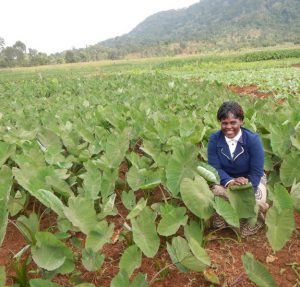Exciting news: Rise Against Hunger has teamed up with U.S.-based non-profit organization Foods Resource Bank (FRB) to ensure that farmers facing hunger around the globe can produce enough food to feed their families year-round. Through this partnership, Rise Against Hunger will support existing FRB agriculture programs in Nicaragua, Cambodia and Kenya:
Building Resilience to Climate Change in Nicaragua
In Nicaragua, where the most pressing challenges include climate change and limited access to water, farmers are learning sustainable agriculture methods at farmer field schools that reverse environmental degradation and maximize scarce water resources. Families are restoring soil through crop rotation and mitigating the risk of crop failure by planting a larger variety of crops, including drought-resistant varieties. Beyond the farm gate, FRB’s in-country partners World Renew and Fundación San Lucas de Nicaragua are also training community leaders how to advocate within their municipalities for water access and climate adaptation plans. To date, three communities (545 people) have succeeded in gaining access to piped water, in no small part due to their willingness to hand dig five miles of trenches for the pipes — part of their cost-share in an agreement with the government. By 2019, 625 beneficiaries will possess the skills to provide their children more nutritious foods, guard their crops against climate-related shocks and gain access to potable water.

Enabling Year-Round Food Access in Kenya
Food availability and access in the Tigania region of Kenya are impacted by frequent droughts and high poverty rates. Many households have low dietary diversity, and only consume one or two meals per day. The nutritional status of children under five fluctuates depending on the availability of milk, which is more scarce during dry months. This project seeks to improve food security for 1,000 people (200 households) in the the Tigania region of Meru County, Kenya, by improving the availability of a variety of foods in the community and the ability of households to access food throughout the year. The initiative will focus on income diversification, by supporting poultry farming, tree planting for food and firewood, as well as diversifying the field crops. So far, farmers in this program have planted 4,000 mango seedlings and have created two tree nurseries with a capacity for 9,500 trees. Improved agricultural methods and stewardship of water will strengthen the potential for larger harvests, even in the face of drought. In this project, farmer field schools teach not only agricultural techniques but also best practices for using the produce to meet the nutritional needs of young children.

Introducing Climate Smart Agriculture in Cambodia
In Cambodia, women farmers have the opportunity to develop their agricultural and business skills through an initiative to grow climate-smart crops in three provinces. In-country partner World Hope International (WHI) pilots affordable technologies like mushroom grow houses, that increase resilience to climate change by reducing water consumption and making use of farming by-products. Project participants receive training in organic horticulture, basic business management and assistance with access to food markets, including supermarkets, processors and restaurants. The area served will also receive increased access to clean, safe water, by drilling deep wells that can provide water for household and garden use for up to 200 families.

New Partnership Helps Families Flourish...
 "
"
No Comments yet!